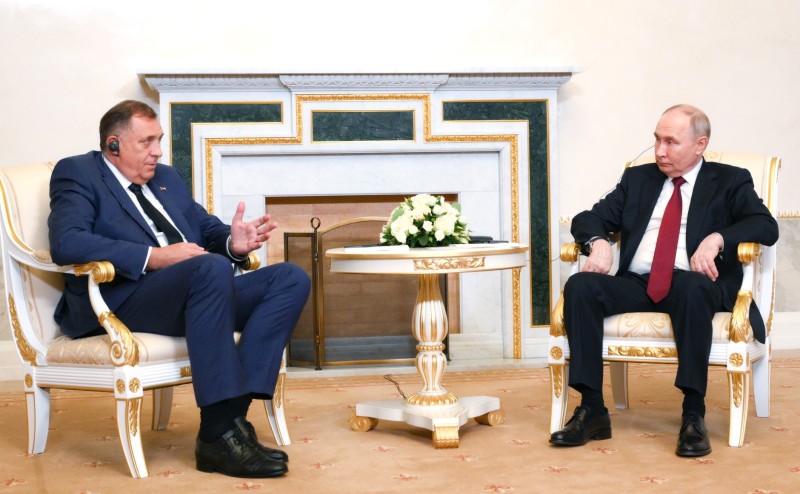The pro-Russian leader has been ruling Republika Srpska (RS) -- the semi-autonomous half of Bosnia and Herzegovina -- for over two decades. While being constantly at odds with the central government in Sarajevo as well as with Western officials, Dodik has maintained close ties with President Vladimir Putin, Serbian President Aleksandar Vučić but also with right-wing Hungarian Prime Minister Viktor Orban.
His efforts to undermine the state institutions and strengthen the institutions of the region he governs are seen as efforts to create circumstances for a secession but some say also to generate one political crisis after another in order to divert attention away from his and his children’s business deals.
So far most of the accusations of corruption against him, he and his supporters have interpreted as political persecution because he is defending Republika Srpska from Bosniak and Western efforts to dismantle the political structures of the region while convincing Serbs living there that their only guarantee of physical survival is the existence of their own national state.
Any attack against him, they portray as an attack against the nation.
This time too.
Apart from a vulgar comment Dodik’s daughter made about President Joseph Biden, none of the Dodiks reacted to the new sanctions. However, his political ally and BiH Security Minister Nenad Nešić, pulled the political persecution card again.
"Obviously, we are witnessing the violence of global powers who, without choosing means and methods, want to sanction or, in other words, tame Republika Srpska (RS) and its officials to comply with what is not part of the Constitution,” he said on Wednesday, referring to his perceived Western efforts to erase Serb autonomy in Bosnia and Herzegovina.
“From here, I want to convey that regardless of what sanctions will be and who will be on them, we will not give up on RS,” said Nešić.
Dodik and his two children have been personally sanctioned by Washington before and Tuesday’s decision is an extension of the measures taken so far against him.
The U.S. Department of the Treasury’s Office of Foreign Assets Control (OFAC) claims that Dodik has exploited his official position to amass personal wealth, channeling funds through companies connected to both himself and his son Igor.
“[Milorad] Dodik used his official position to direct RS government contracts to a network of private companies that he and Igor oversee,” according to OFAC.
The sanctioned entities include Infinity International Group d.o.o. Banja Luka, a holding company that directly or indirectly oversees several within the network: Prointer ITSS d.o.o. Banja Luka, Clan Infinity International Group, Kaldera Company El PGP d.o.o., Infinity Media d.o.o., K-2 Audio Services Banja Luka d.o.o., and Una World Network d.o.o.
“For example, in 2024, Igor and Milorad Dodik exercised their control over senior BiH government officials to manipulate the draft BiH state budget so that a state-level contract could be awarded to Prointer ITSS d.o.o. Banja Luka Clan Infinity International Group—an entity in the network—outside of the competitive process,” according to the OFAC statement.
Adding to the designated network, Sirius 2010 d.o.o. Banja Luka stands out as a pivotal information technology (IT) player tied to the Dodik family. Alongside Prointer and Kaldera, Sirius has carved a reputation in Bosnia and Herzegovina for clinching significant government contracts. Together, Prointer and Sirius cater to the IT needs of RS and BiH government bodies, while Kaldera takes the lead in engineering projects, according to OFAC.
OFAC alleges that Igor Dodik controls numerous companies in the network, concealing his ties to them through the employment of nominal owners and directors.
Washington also sanctioned Đorđe Đurić, the ultimate owner of Infinity and its subsidiaries, and Milenko Čičić, the general director of Kaldera.
However, OFAC underscored that while Đurić and Čičić hold key positions within the network, it is Igor Dodik who wields ultimate authority over financial decisions for entities such as Prointer and Kaldera, with his approval pivotal for key business choices.
“Đurić and Igor [Dodik] deliberately took steps to obfuscate their involvement in an offshore bank account and entity over which they shared control, probably enabling Igor to move millions of euros overseas,” read the statement.
Additionally, OFAC noted frequent corporate ownership restructuring within the Dodik network, aimed at concealing familial roles and evading sanctions.
The U.S. administration warned that “Dodik not only robs the people of BiH through his corrupt behavior but also threatens their safety and security through his repeated threats to pursue secession of the RS from BiH.”
The 65-year-old nationalist has been threatening to secede Republika Srpska for over a decade. He has been particularly attacking Bosnia and Herzegovina’s judicial system, often claiming it should not have any jurisdiction in his part of the country.
Analysts have explained those attacks with his fear of courts that are not under his control.
“Through his corruption and secessionist rhetoric, Dodik continues to undermine BiH institutions and enrich his family at the people’s expense, further risking BiH’s future in Euro-Atlantic institutions,” read the statement.
Milorad Dodik himself was designated by the U.S. on January 5, 2022, for his involvement in or complicity with violations of the Dayton Peace Agreement, which brokered peace in the Balkan country, halting the 1992-95 war, as well as for corrupt activities. Previously, U.S. authorities sanctioned him in 2017 for violating the 1995 peace agreement.
In October 2023, concerns about RS resembling a Dodik family enterprise rather than a political entity within BiH led the U.S. to sanction Dodik’s children—son Igor and daughter Gorica—along with four companies under their management.



